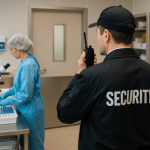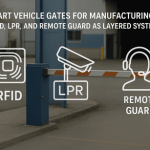For years, security cameras in hospitals served a simple purpose—record what happens. But today, thanks to artificial intelligence (AI) and advanced analytics, those same cameras are doing far more than capturing footage. They are helping healthcare facilities prevent incidents, streamline operations, and strengthen compliance.
Video intelligence is transforming how hospitals think about safety. It is not just about watching. It is about understanding.
l
l
What Is Video Intelligence in Healthcare Security
Video intelligence refers to the use of AI-powered analytics to interpret live and recorded video feeds. Instead of relying on human monitoring alone, these systems can detect patterns, identify anomalies, and send alerts when something unusual occurs.
In healthcare environments, video intelligence can:
-
Identify unauthorized access attempts in restricted zones
-
Detect patient movement in secure or sensitive areas
-
Alert staff to potential safety hazards, such as patient elopement or crowding
-
Track staff and visitor flow to improve operational efficiency
The goal is not to replace people—it is to give them better information, faster.
l
l
From Reactive to Proactive Security
Traditional video surveillance is reactive. Something happens, and staff review the footage later. With video intelligence, hospitals can respond as incidents unfold.
For example:
-
If a person tailgates through an access-controlled door, the system can trigger an alert immediately.
-
If an individual is lingering near a pharmacy after hours, it can notify security staff in real time.
-
If a patient in a behavioral health unit leaves a secure area, the system can pinpoint their location within seconds.
This shift from reacting to preventing allows hospitals to act faster, protect staff, and reduce risk.
l
l
Improving More Than Security
Video intelligence is also proving valuable beyond traditional security roles. Hospitals are using analytics to enhance efficiency and patient care.
Operational insights: By analyzing foot traffic patterns, administrators can optimize staffing levels and reduce bottlenecks in high-traffic areas such as emergency departments or main entrances.
Patient experience: Systems can monitor wait times and notify staff when patient queues grow too long, helping improve service quality.
Compliance support: Automated recording and event logging simplify HIPAA documentation and audit trails, reducing manual reporting tasks.
By combining security and operational data, healthcare facilities can create safer, more responsive environments.
l
l
Addressing Privacy and Compliance
With great capability comes great responsibility. Hospitals must ensure that video intelligence systems align with HIPAA and other privacy standards.
Here are key best practices:
-
Use privacy masking to blur patient faces or restricted areas in recorded video.
-
Store footage securely using encryption and access controls.
-
Maintain detailed audit trails of who accessed video and why.
-
Choose HIPAA-compliant vendors who understand healthcare regulations.
Responsible implementation ensures hospitals benefit from AI-driven insights without compromising patient trust.
l
l
Real-World Example
A regional hospital system recently upgraded from traditional video monitoring to an AI-enabled platform. Within weeks, the system detected several after-hours access attempts in a pharmacy and identified a pattern of unauthorized door holds in surgical areas.
These alerts allowed security staff to respond quickly, preventing potential security breaches. At the same time, analytics revealed workflow inefficiencies in patient transport routes, which the hospital later improved.
The result was stronger safety and smoother operations—proof that smarter surveillance can serve both security and efficiency goals.
l
l
The Future of Video Intelligence in Healthcare
As AI continues to evolve, hospitals will see even greater benefits from intelligent video systems. Predictive analytics will help anticipate potential incidents before they occur. Integrated access control and video platforms will provide unified, real-time visibility across entire campuses.
In the coming years, video intelligence will not just protect hospitals—it will help run them more effectively.
Talk to SSP about implementing AI-powered, HIPAA-compliant video intelligence systems that strengthen security, improve efficiency, and protect what matters most.


